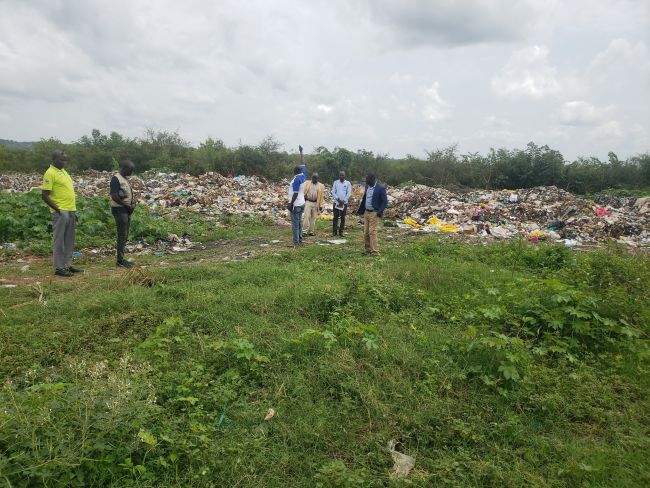ADJUMANI, November 9, 2025 — Residents of Unna village in Pachara Sub-county, Adjumani district, are demanding the immediate closure of a poorly managed landfill, accusing the town council authorities of negligence. They say the dumping site has turned into a source of disease, foul odor, and environmental pollution.
According to Grace Aziku, the Parish Councillor, waste from the site has contaminated nearby water sources used by the community.
“So far, eight children in the area have been diagnosed with Bilharzia. The dirty water from the landfill flows into our water sources, putting everyone’s health at risk,” she said.
Angelo Wajarasu, the Defense Secretary of Rusia East village, described the situation as unbearable.
“We no longer breathe fresh air. The place is filthy, and the stench is overwhelming,” he lamented.
The LCI Chairperson of Rusia East, Alex Chandiaga Vuga, accused the town council of negligence, warning that residents might resort to peaceful protests if no action is taken.
“This is not a burial ground, yet three unclaimed bodies from the town have been buried here without our consent. We offered this land for waste disposal, not for burials,” he said.
Adjumani District Natural Resource Officer, Charles Giyaya, confirmed that the landfill lacks an Environmental Impact Assessment [EIA] certificate, making it illegal. He noted poor waste segregation as a key challenge, with households mixing organic waste with non-biodegradable materials like plastics and paper, which complicates recycling and disposal.
“The town council currently lacks active recycling initiatives. Unlike Gulu, which runs successful recycling projects in plastics and organic waste, Adjumani has yet to tap into this economic opportunity,” Giyaya shared.
He urged the council to view waste as a potential source of income and to introduce recycling and composting programs.
He further explained that the landfill occupies about 10 acres, far below the 40 acres recommended by the National Environment Management Authority [NEMA] for proper waste management. “Such a facility should be fenced and equipped with systems to handle leachate, the liquid that seeps from waste and causes odor and contamination,” he added.
Ms. Korina Ondoa called on the town council to allocate funds for waste management and enforce bylaws against illegal dumping. “The council should fence off the landfill to prevent children and traders from dumping hazardous waste there,” she said.
Pachara Subcounty LCIII Chairperson, Kennedy Kanzo, revealed that the council had repeatedly resolved to relocate the dumping site, but their resolutions were never implemented. “This landfill needs to be moved because there are also ownership disputes over the land, which makes getting a title difficult,” he noted.
Under the Strengthening Environmental Accountability and Climate Action in West Nile Project, implemented by Friends of Zoka, RICE West Nile, and the African Centre for Energy and Mineral Policy, residents are hopeful for change.
Project Manager Sadam Mokili appealed to stakeholders to work collaboratively to tackle environmental challenges while promoting good governance and accountability. “We are empowering communities with knowledge on environmental management and constructive engagement with duty bearers. Sustainable impact requires collective effort, responsiveness, and commitment to addressing these environmental issues,” Mokili emphasised.
In response, Patrick Keleture, the Town Clerk Adjumani Town Council, acknowledged the shortcomings in managing the landfill, saying the challenges are widespread but efforts are underway to improve the situation.
He attributed the poor management of the dumping site to limited funding and inadequate equipment.
“We have an insufficient budget for waste management and face serious equipment constraints,” he said.
However, Keleture revealed that the town council has already secured new land for waste disposal and plans are in progress to relocate the current site.
“Once we finalise the necessary arrangements, we shall move the landfill to the new location. For now, we urge the community to cooperate and work together with us as we address these challenges,” he added.
Buy your copy of thecooperator magazine from one of our country-wide vending points or an e-copy on emag.thecooperator.news
